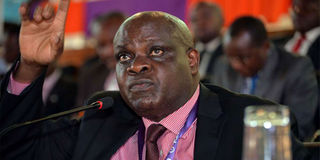KenGen sets up unit to handle project conflicts

Kengen Chairman Joshua Choge speaks during the company Annual General Meeting (AGM) at Safaricom Kasarani Stadium on November 30, 2016. PHOTO | SALATON NJAU
What you need to know:
- Company avoids wrangles with communities through ‘structured dialogue’
Kenya Electricity Generating Company (KenGen) has announced plans to set up a special unit to address public concerns during the design and execution of its projects.
The team will monitor rollout of all KenGen initiatives and handle grievances as the power generator moves to cut the cost of implementing solar, geothermal and wind projects.
Chief Executive Rebecca Miano said on Wednesday the community engagement move would reduce risks as KenGen undertakes its mega energy projects, mainly in geothermal.
“As an organisation, we have seen community expectations change over time, meaning we must always adjust the way we relate with them to fit into the dynamic environment in which we operate,” said Ms Miano.
“It is also important to point out that there is a growing need for communities to have a greater voice in the priorities and decisions that affect them”.
KenGen, which is leading Kenya’s shift to renewable energy, has previously rolled out big-ticket wind and geothermal projects that involved relocating communities. Its construction of wind farm in Ngong and extraction of geothermal energy in Naivasha have never attracted resistance in the scale witnessed by Kenya Electricity Transmission Company Limited’s power lines in the area or Tullow Oil in northern Kenya.
Under the community engagement strategy developed in partnership with bilateral partners, KenGen has prioritised a “structured dialogue” with communities to prevent conflict as its rolls out projects to expand access to electricity.
"The government is keen to secure goodwill from communities to ensure there is speedy implementation of energy infrastructure projects," said Energy Secretary Charles Keter.
"By involving communities at all stages of the project's implementation, we will avoid litigation that push up their cost and undermine the goal of achieving universal access to power for households by 2022."
Kenya has outlined an ambitious mid-term goal of generating 5,000 megawatts of power to feed its Vision 2030 energy needs.
The officials said future investments in power generation and distribution would be ecologically sensitive and responsive to the social and economic needs of local communities.
"We believe that adopting practices that are responsive to the needs of local communities is key to success of our operations," said Joshua Choge, KenGen board chairman.




